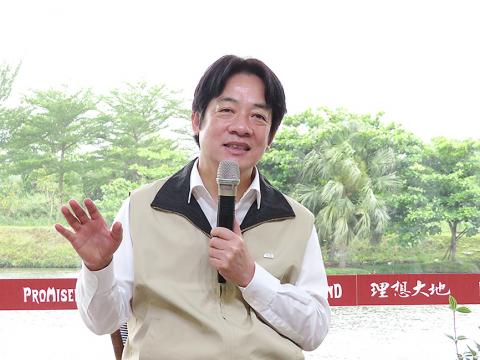Premier William Lai (賴清德) yesterday told reporters that his approach toward Taiwanese independence was pragmatic and based on three tenets.
Lai held a media roundtable in Hualien County, where reporters asked about his depiction of himself as a “political worker for Taiwanese independence.” He had once again used the term at an April 3 seminar on freedom of speech held by the Ministry of the Interior.
He said the first tenet is that Taiwan is a sovereign, independent nation and therefore does not need to declare independence, Lai said.

Photo: Lee Hsin-fang, Taipei Times
The second is that only the nation’s 23 million people have the right to decide Taiwan’s future, and the third is that building up Taiwan and making it stronger and more attractive to people so that they support it is a practical approach to Taiwanese independence, Lai said.
Working for Taiwanese independence involves safeguarding the nation’s sovereignty, protecting its freedom, democracy and human rights, and safeguarding the public’s right to decide Taiwan’s future, he added.
It also means developing the economy and creating growth so that people can live and work in peace; maintaining peaceful development and enhancing mutual understanding across the Taiwan Strait; and working with Japan, South Korea and the US to ensure security in the Asia-Pacific region, he said.
While Lai has consistently emphasized his role as a “Taiwanese independence worker,” it has taken different tones over the past year.
At the April 3 seminar, Lai recalled saying during his first administrative report to the Legislative Yuan as premier in September last year that he was a “Taiwanese independence worker,” but added: “I did not say I advocate Taiwanese independence.”
However, in that report on Sept. 26, Lai told lawmakers that when he was Tainan mayor, he had told the city council that he was a “political worker who advocates Taiwanese independence” and that “this will not change, no matter what position I am in.”
In June last year, while still mayor, Lai said he felt an “affinity toward China as much as he loves Taiwan,” and argued at the legislative hearing in September that this did not contradict his stance on Taiwanese independence.
Chinese media reported that live-fire exercises in the Taiwan Strait scheduled for Wendesday by the People’s Liberation Army on Wednesday would serve as a warning after Lai’s pro-independence statements.
However, Lai yesterday said that his support for Taiwanese independence started in the 1990s and his political beliefs are well known.

CHAOS: Iranians took to the streets playing celebratory music after reports of Khamenei’s death on Saturday, while mourners also gathered in Tehran yesterday Iranian Supreme Leader Ayatollah Ali Khamenei was killed in a major attack on Iran launched by Israel and the US, throwing the future of the Islamic republic into doubt and raising the risk of regional instability. Iranian state television and the state-run IRNA news agency announced the 86-year-old’s death early yesterday. US President Donald Trump said it gave Iranians their “greatest chance” to “take back” their country. The announcements came after a joint US and Israeli aerial bombardment that targeted Iranian military and governmental sites. Trump said the “heavy and pinpoint bombing” would continue through the week or as long

TRUST: The KMT said it respected the US’ timing and considerations, and hoped it would continue to honor its commitments to helping Taiwan bolster its defenses and deterrence US President Donald Trump is delaying a multibillion-dollar arms sale to Taiwan to ensure his visit to Beijing is successful, a New York Times report said. The weapons sales package has stalled in the US Department of State, the report said, citing US officials it did not identify. The White House has told agencies not to push forward ahead of Trump’s meeting with Chinese President Xi Jinping (習近平), it said. The two last month held a phone call to discuss trade and geopolitical flashpoints ahead of the summit. Xi raised the Taiwan issue and urged the US to handle arms sales to

BIG SPENDERS: Foreign investors bought the most Taiwan equities since 2005, signaling confidence that an AI boom would continue to benefit chipmakers Taiwan Semiconductor Manufacturing Co’s (TSMC, 台積電) market capitalization swelled to US$2 trillion for the first time following a 4.25 percent rally in its American depositary receipts (ADR) overnight, putting the world’s biggest contract chipmaker sixth on the list of the world’s biggest companies by market capitalization, just behind Amazon.com Inc. The site CompaniesMarketcap.com ranked TSMC ahead of Saudi Aramco and Meta Platforms Inc. The Taiwanese company’s ADRs on Tuesday surged to US$385.75 on the New York Stock Exchange, as strong demand for artificial intelligence (AI) applications led to chip supply constraints and boost revenue growth to record-breaking levels. Each TSMC ADR represents

State-run CPC Corp, Taiwan (CPC, 台灣中油) yesterday said that it had confirmed on Saturday night with its liquefied natural gas (LNG) and crude oil suppliers that shipments are proceeding as scheduled and that domestic supplies remain unaffected. The CPC yesterday announced the gasoline and diesel prices will rise by NT$0.2 and NT$0.4 per liter, respectively, starting Monday, citing Middle East tensions and blizzards in the eastern United States. CPC also iterated it has been reducing the proportion of crude oil imports from the Middle East and diversifying its supply sources in the past few years in response to geopolitical risks, expanding